Module 12 Unit 3 Language in use课件2023-2024学年度外研版英语七年级下册
文档属性
| 名称 | Module 12 Unit 3 Language in use课件2023-2024学年度外研版英语七年级下册 |
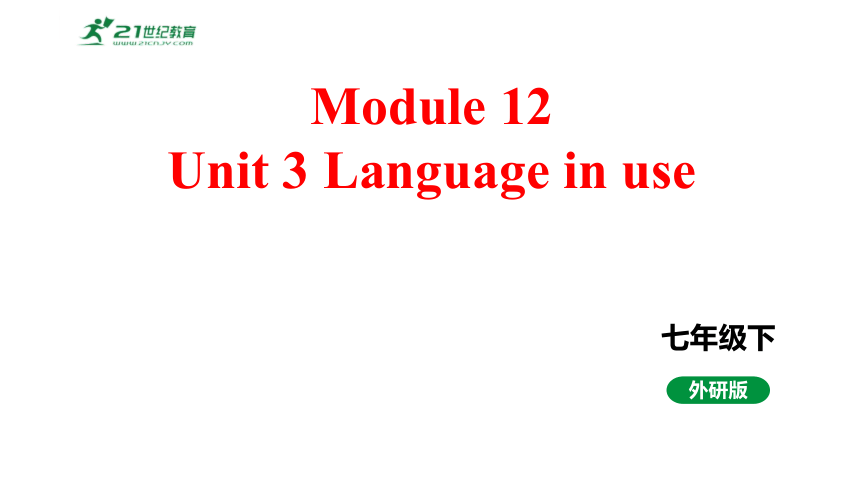
|
|
| 格式 | pptx | ||
| 文件大小 | 8.2MB | ||
| 资源类型 | 试卷 | ||
| 版本资源 | 外研版 | ||
| 科目 | 英语 | ||
| 更新时间 | 2024-04-26 00:00:00 | ||
图片预览

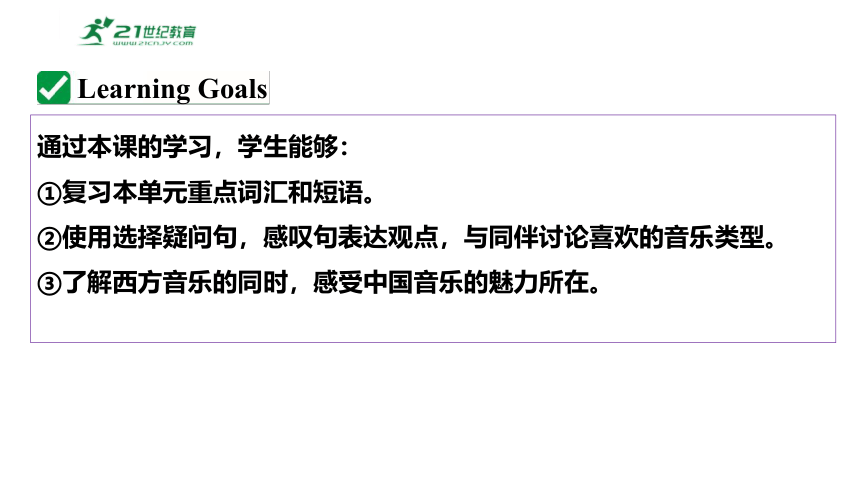
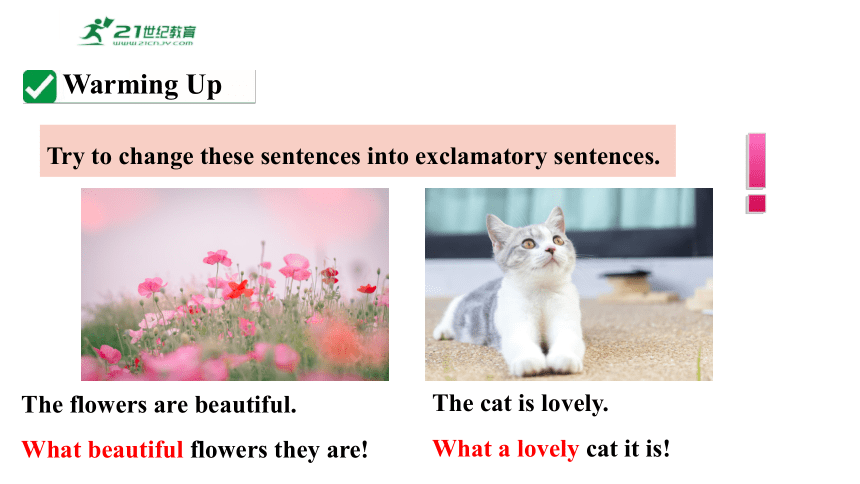
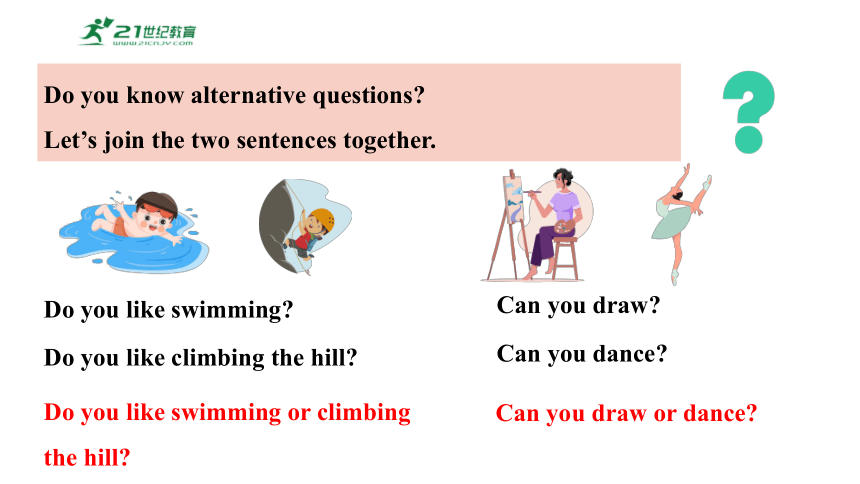
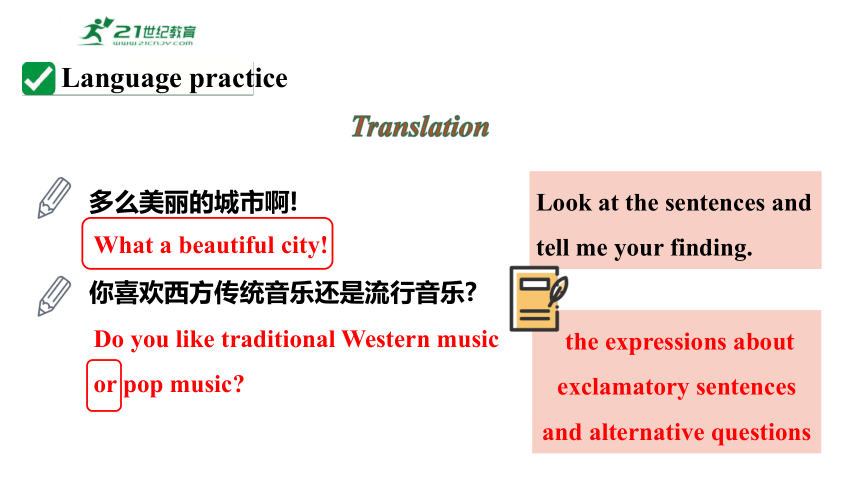
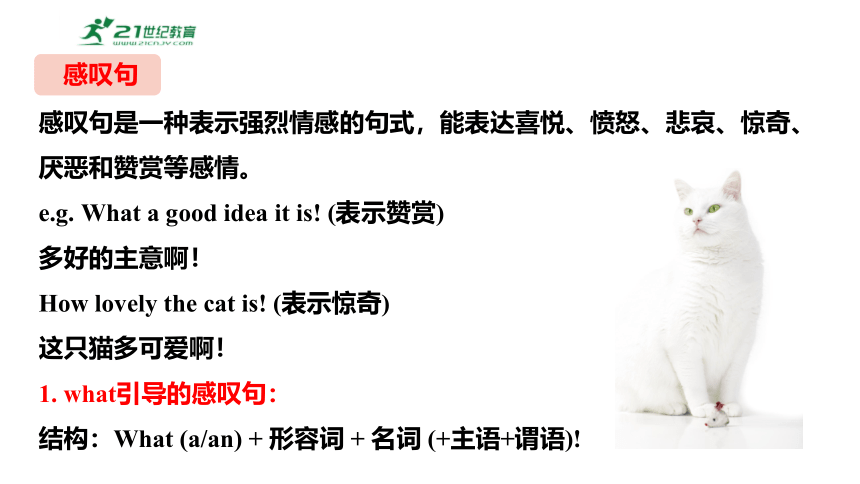
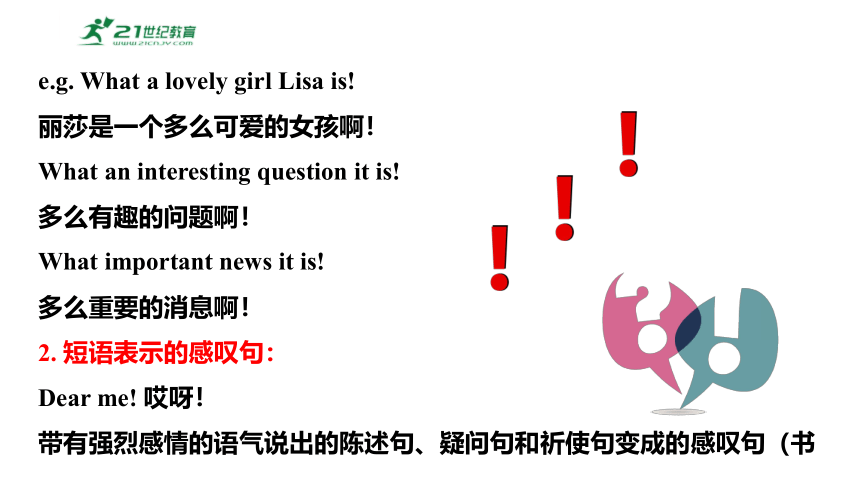
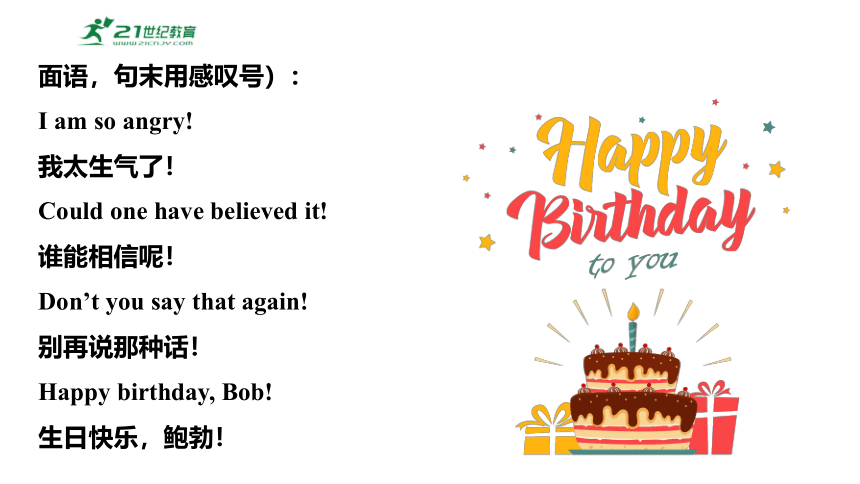
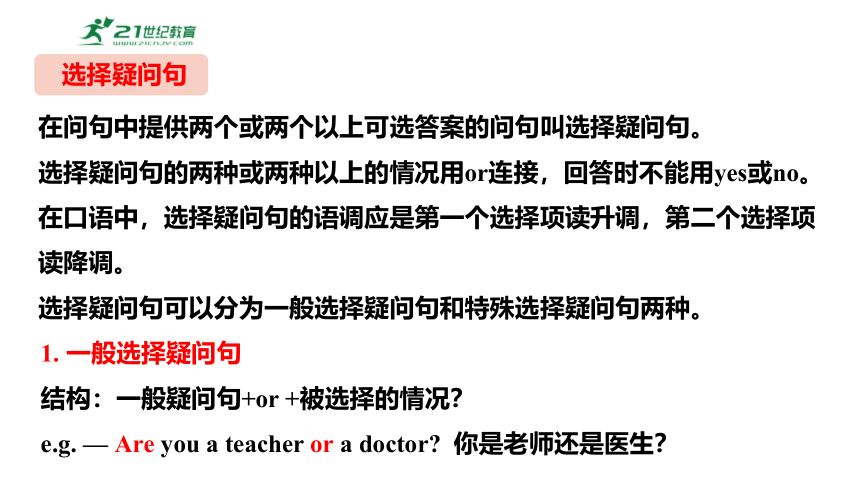
文档简介
(共22张PPT)
Module 12
Unit 3 Language in use
七年级下
外研版
Learning Goals
通过本课的学习,学生能够:
①复习本单元重点词汇和短语。
②使用选择疑问句,感叹句表达观点,与同伴讨论喜欢的音乐类型。
③了解西方音乐的同时,感受中国音乐的魅力所在。
Try to change these sentences into exclamatory sentences.
Warming Up
The flowers are beautiful.
What beautiful flowers they are!
The cat is lovely.
What a lovely cat it is!
Do you know alternative questions
Let’s join the two sentences together.
Do you like swimming
Do you like climbing the hill
Do you like swimming or climbing
the hill
Can you draw
Can you dance
Can you draw or dance
the expressions about exclamatory sentences and alternative questions
Language practice
Translation
多么美丽的城市啊!
你喜欢西方传统音乐还是流行音乐
What a beautiful city!
Do you like traditional Western music or pop music
Look at the sentences and tell me your finding.
感叹句是一种表示强烈情感的句式,能表达喜悦、愤怒、悲哀、惊奇、厌恶和赞赏等感情。
e.g. What a good idea it is! (表示赞赏)
多好的主意啊!
How lovely the cat is! (表示惊奇)
这只猫多可爱啊!
1. what引导的感叹句:
结构:What (a/an) + 形容词 + 名词 (+主语+谓语)!
感叹句
e.g. What a lovely girl Lisa is!
丽莎是一个多么可爱的女孩啊!
What an interesting question it is!
多么有趣的问题啊!
What important news it is!
多么重要的消息啊!
2. 短语表示的感叹句:
Dear me! 哎呀!
带有强烈感情的语气说出的陈述句、疑问句和祈使句变成的感叹句(书
面语,句末用感叹号):
I am so angry!
我太生气了!
Could one have believed it!
谁能相信呢!
Don’t you say that again!
别再说那种话!
Happy birthday, Bob!
生日快乐,鲍勃!
在问句中提供两个或两个以上可选答案的问句叫选择疑问句。
选择疑问句的两种或两种以上的情况用or连接,回答时不能用yes或no。在口语中,选择疑问句的语调应是第一个选择项读升调,第二个选择项读降调。
选择疑问句可以分为一般选择疑问句和特殊选择疑问句两种。
选择疑问句
1. 一般选择疑问句
结构:一般疑问句+or +被选择的情况?
e.g. — Are you a teacher or a doctor 你是老师还是医生?
— I’m a doctor. 我是医生。
— Did you work out the maths problem in this way or (in) that way
你是用这种方法还是用那种方法把这道数学题算出来的?
— I did it in that way.
我是用那种方法算出来的。
2. 特殊选择疑问句
结构:特殊疑问句,A or B
e.g. — Which is bigger, Beijing or Hangzhou
北京和杭州,哪个城市大些?
— Beijing.
北京。
— When will he leave for Beijing, today or tomorrow
他什么时候去北京,今天还是明天?
— Tomorrow.
明天。
注意:
1. or之后如果为单数可数名词,必须要加上冠词。
2. 选择疑问句中or所连接的可以是不同的内容,如两个名词,两个动词,两个介词短语等。但or所连接的内容一定是并列的,如果or的前面是名词,其后也应该是名词;如果是动词,其后也必须是动词。
1. Write questions.
you / like / pop / traditional music
Do you like pop or traditional music
1 (be) / Strauss / German / Austrian
Is Strauss German or Austrian
2 (be) / this / pop / rock
Is this pop or rock music
3 they / play / traditional music / modern music
Do they play traditional music or modern music
4 he / play / piano / violin
Does he play the piano or the violin
5 where / (can) we / hear / rock music / in / New York / London
Where can we hear rock music, in New York or in London
2. Write exclamations with What (a)… !
This is beautiful music.
What beautiful music this is!
1 Vienna is a beautiful old city.
What a beautiful old city Vienna is!
2 It is a successful concert.
What a successful concert it is!
3. Put the words and expression into the correct column.
drum fan musician piano pop
rock traditional music violin
Types of music Instruments People
pop
rock
traditional music
drum
piano
violin
fan
musician
4. Complete the conversation with the correct form of the words from the box.
come give hear learn love write
Lingling: This is beautiful music. Who wrote it, Betty
Betty: Beethoven wrote it. He was a great musician. I (1)______his music.
Lingling: Me too. Did he live at the same time as Mozart
Betty: Yes, he was born in 1770 and began to (2)_______music at an early age. He (3)________ his first piano concert when he was only seven.
love
learn
gave
come give hear learn love write
Lingling: When did he start to (4)________music
Betty: Very early. His first work (5)________ out before the age of thirteen.
Lingling: Was Beethoven famous at that time
Betty: Yes. But he began to lose his hearing. In the last ten years of Beethoven’s life, he (6) ________nothing.
Lingling: That’s sad!
Betty: Yes, but he still played the piano. He died when he was fifty-six.
write
came
heard
Look at the picture and describe what you can see
Around the world
Vienna New Year’s Concert
Every year, the Vienna New Year’s Concert takes place on 1st January. It is a classical music concert and it always includes pieces of music by the
Strauss family. People all over the world watch it on TV and enjoy the music.
举行
v. 包括;包含
全世界
v. 享受……的乐趣;欣赏
5. Work in pairs. Talk about one or two types of Chinese music.
Talking about Chinese music
beautiful fast lively modern sad slow
Choose one or two types of Chinese music and describe them. Use the words from the box.
Say which types of music you like. Give your reasons.
Now talk about Chinese music in front of the class.
Module task
1.Grammar:
To practise exclamatory sentences and alternative questions
To practise the expression of preference
To practise the key words of this module
2. Reading:
Music concert
Summary
Module 12
Unit 3 Language in use
七年级下
外研版
Learning Goals
通过本课的学习,学生能够:
①复习本单元重点词汇和短语。
②使用选择疑问句,感叹句表达观点,与同伴讨论喜欢的音乐类型。
③了解西方音乐的同时,感受中国音乐的魅力所在。
Try to change these sentences into exclamatory sentences.
Warming Up
The flowers are beautiful.
What beautiful flowers they are!
The cat is lovely.
What a lovely cat it is!
Do you know alternative questions
Let’s join the two sentences together.
Do you like swimming
Do you like climbing the hill
Do you like swimming or climbing
the hill
Can you draw
Can you dance
Can you draw or dance
the expressions about exclamatory sentences and alternative questions
Language practice
Translation
多么美丽的城市啊!
你喜欢西方传统音乐还是流行音乐
What a beautiful city!
Do you like traditional Western music or pop music
Look at the sentences and tell me your finding.
感叹句是一种表示强烈情感的句式,能表达喜悦、愤怒、悲哀、惊奇、厌恶和赞赏等感情。
e.g. What a good idea it is! (表示赞赏)
多好的主意啊!
How lovely the cat is! (表示惊奇)
这只猫多可爱啊!
1. what引导的感叹句:
结构:What (a/an) + 形容词 + 名词 (+主语+谓语)!
感叹句
e.g. What a lovely girl Lisa is!
丽莎是一个多么可爱的女孩啊!
What an interesting question it is!
多么有趣的问题啊!
What important news it is!
多么重要的消息啊!
2. 短语表示的感叹句:
Dear me! 哎呀!
带有强烈感情的语气说出的陈述句、疑问句和祈使句变成的感叹句(书
面语,句末用感叹号):
I am so angry!
我太生气了!
Could one have believed it!
谁能相信呢!
Don’t you say that again!
别再说那种话!
Happy birthday, Bob!
生日快乐,鲍勃!
在问句中提供两个或两个以上可选答案的问句叫选择疑问句。
选择疑问句的两种或两种以上的情况用or连接,回答时不能用yes或no。在口语中,选择疑问句的语调应是第一个选择项读升调,第二个选择项读降调。
选择疑问句可以分为一般选择疑问句和特殊选择疑问句两种。
选择疑问句
1. 一般选择疑问句
结构:一般疑问句+or +被选择的情况?
e.g. — Are you a teacher or a doctor 你是老师还是医生?
— I’m a doctor. 我是医生。
— Did you work out the maths problem in this way or (in) that way
你是用这种方法还是用那种方法把这道数学题算出来的?
— I did it in that way.
我是用那种方法算出来的。
2. 特殊选择疑问句
结构:特殊疑问句,A or B
e.g. — Which is bigger, Beijing or Hangzhou
北京和杭州,哪个城市大些?
— Beijing.
北京。
— When will he leave for Beijing, today or tomorrow
他什么时候去北京,今天还是明天?
— Tomorrow.
明天。
注意:
1. or之后如果为单数可数名词,必须要加上冠词。
2. 选择疑问句中or所连接的可以是不同的内容,如两个名词,两个动词,两个介词短语等。但or所连接的内容一定是并列的,如果or的前面是名词,其后也应该是名词;如果是动词,其后也必须是动词。
1. Write questions.
you / like / pop / traditional music
Do you like pop or traditional music
1 (be) / Strauss / German / Austrian
Is Strauss German or Austrian
2 (be) / this / pop / rock
Is this pop or rock music
3 they / play / traditional music / modern music
Do they play traditional music or modern music
4 he / play / piano / violin
Does he play the piano or the violin
5 where / (can) we / hear / rock music / in / New York / London
Where can we hear rock music, in New York or in London
2. Write exclamations with What (a)… !
This is beautiful music.
What beautiful music this is!
1 Vienna is a beautiful old city.
What a beautiful old city Vienna is!
2 It is a successful concert.
What a successful concert it is!
3. Put the words and expression into the correct column.
drum fan musician piano pop
rock traditional music violin
Types of music Instruments People
pop
rock
traditional music
drum
piano
violin
fan
musician
4. Complete the conversation with the correct form of the words from the box.
come give hear learn love write
Lingling: This is beautiful music. Who wrote it, Betty
Betty: Beethoven wrote it. He was a great musician. I (1)______his music.
Lingling: Me too. Did he live at the same time as Mozart
Betty: Yes, he was born in 1770 and began to (2)_______music at an early age. He (3)________ his first piano concert when he was only seven.
love
learn
gave
come give hear learn love write
Lingling: When did he start to (4)________music
Betty: Very early. His first work (5)________ out before the age of thirteen.
Lingling: Was Beethoven famous at that time
Betty: Yes. But he began to lose his hearing. In the last ten years of Beethoven’s life, he (6) ________nothing.
Lingling: That’s sad!
Betty: Yes, but he still played the piano. He died when he was fifty-six.
write
came
heard
Look at the picture and describe what you can see
Around the world
Vienna New Year’s Concert
Every year, the Vienna New Year’s Concert takes place on 1st January. It is a classical music concert and it always includes pieces of music by the
Strauss family. People all over the world watch it on TV and enjoy the music.
举行
v. 包括;包含
全世界
v. 享受……的乐趣;欣赏
5. Work in pairs. Talk about one or two types of Chinese music.
Talking about Chinese music
beautiful fast lively modern sad slow
Choose one or two types of Chinese music and describe them. Use the words from the box.
Say which types of music you like. Give your reasons.
Now talk about Chinese music in front of the class.
Module task
1.Grammar:
To practise exclamatory sentences and alternative questions
To practise the expression of preference
To practise the key words of this module
2. Reading:
Music concert
Summary
同课章节目录
- Module 1 Lost and found
- Unit 1 Whose bag is this?
- Unit 2 Are they yours?
- Unit 3 Language in use
- Module 2 What can you do ?
- Unit 1 I can play the piano
- Unit 2 I can run really fast
- Unit 3 Language in use
- Module 3 Making plans
- Unit 1 What are you going to do at the weekends?
- Unit 2 We're going to cheer the players.
- Unit 3 Language in use
- Module 4 Life in the future
- Unit 1 Everyone will study at home
- Unit 2 Every family will have a small plane.
- Unit 3 Language in use
- Module 5 Shopping
- Unit 1 What can I do for you?
- Unit 2 You can buy everything on the Internet
- Unit 3 Language in use
- Module 6 Around town
- Unit 1 Could you tell me how to get to the Nationa
- Unit 2 The London Eye is on your right.
- Unit 3 Language in use
- Revision module A
- Module 7 My past life
- Unit 1 I was born in a small village.
- Unit 2 I was born in Quincy.
- Unit 3 Language in use
- Module 8 Story time
- Unit 1 Once upon a time….
- Unit 2 Goldilocks hurried out of the house.
- Unit 3 Language in use
- Module 9 Life history
- Unit 1 He left school and began work at the age of
- Unit 2 He decided to be an actor.
- Unit 3 Language in use
- Module 10 A holiday journey
- Unit 1 What did you do?
- Unit 2 This morning we took a walk.
- Unit 3 Language in use
- Module 11 Body language
- Unit 1 They touch noses!
- Unit 2 Here are some ways to welcome them.
- Unit 3 Language in use
- Module 12 Western music
- Unit 1 It's so beautiful!
- Unit 2 Vienna is the centre of European classical
- Unit 3 Language in use
- Revision module B
